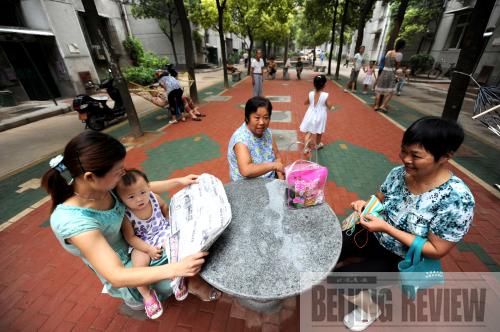Rising to new heights
The Sixth Plenary Session of the 16th CPC Central Committee held in 2006 and the 17th CPC National Congress held in 2007 pledged to facilitate the establishment of a social security system covering both urban and rural residents and focusing on basic pension, basic medical care and basic-living guarantee system. At the end of 2008, basic pension insurance for urban residents covered 218.9 million people; basic medical insurance for urban residents covered 316.98 million; unemployment insurance covered 124 million; work injury insurance covered 138.1 million; and maternity insurance covered 91.81 million.
In 2008, 23.34 million urban residents and 42.91 rural residents were covered by the government's basic-living guarantee system. Nearly 50 million migrant workers participated in work injury insurance, and more than 40 million took part in urban medical insurance. Meanwhile, 2,729 counties launched the new rural cooperative medical-care program, covering 814 million, or 91.5 percent of Chinese farmers. The total expenditure of the new rural cooperative medical-care program reached 42.9 billion yuan ($6.28 billion), benefiting 370 million farmers.
China abolished the agricultural tax in 2006, ending the 2,600-year-long tax imposed on farmers. Establishing a social security system, covering not only urban dwellers but also rural residents, is a milestone decision that has put an end to an era when farmers were not covered by any social security plan.
Future tasks
- Applying the Scientific Outlook on Development
China has changed its strategy of development from seeking economic growth at all costs to pursuing comprehensive, balanced and sustainable development—an inevitable transition that the country has achieved as it moves into a new stage of development and modernization. The adjustment means that the government should judge its performance based on improvements in people's living standards instead of GDP growth.
One of the most important lessons China has learned since it adopted its reform and opening-up policy in the late 1970s is that it should promote balanced development between urban and rural areas, as well as between different regions, the economy and society, and even mankind and nature. It must also strike a balance between coordinating development at home and opening up to the outside world. As China jumpstarts its economy, it should properly address problems in employment, income distribution, social security, education, medical care, housing, public security and environmental protection.
- Focusing on improving livelihoods
China's experience in seeking development since 1949 has shown that it is not reasonable to put production before consumption, nor is it sensible to achieve economic growth at the cost of social development. Social programs aimed at improving people's lives can also bring about economic benefits. For example, medical care services can fuel the development of the pharmaceutical industry; efforts to build a green environment can help the landscaping industry prosper; and investment in education always generates better returns than investment in assets.
As it improves people's livelihoods, China will be able to increase its domestic demand. A large consumer market at home, in turn, will make it more competent to cope with drastic fluctuations in the world economy.
- Balancing social and economic development
 |
|
ENJOYING LIFE: Residents of Wuhan City, provincial capital of Hubei Province, spend some quality time with their friends in a community newly refurbished by the government (YU GUOQING) |
In a bid to promote social development, the Chinese Government needs to increase funding for the provision of public goods and services. At the same time, it should bear in mind that welfare levels tend to keep rising despite economic cycles. As a developing country, China should seek social development in light of its economic growth so that social programs do not become a burden on its economy.
- Allocating resources efficiently
China is not a rich country. In fact, the Chinese Government is experiencing financial strains in all sectors of social development. It should not, however, boost its coffers by collecting taxes, because heavy taxes will make Chinese companies less competitive in the international market. The only way out is to allocate resources efficiently by taking into consideration both economic and social benefits. It needs to establish a sound resource allocation system by which to determine how to use poverty alleviation funds to the benefit of more needy people, how to spend money on environmental protection more effectively and how to distribute educational resources more equitably.
 0
0 






